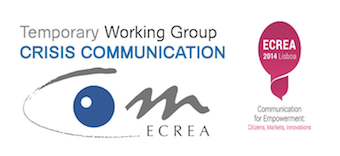On November 11, 2014 the Preconference to the 4th EC Conference ECREA will be held in Lisbon, Portugal. Is is planned as one day multi-track conference (i.e. with parallel
sessions) on the day before the program start of the main ECC conference ECREA
(11 November 2014). In addition to the presentations we will have Professor
William Benoit how keynote speaker.
The preconference pretend provide a
small and interactive setting with 20 participants and a limited of parallel
sessions. The conference draw participants from crisis management and
communication around the world, primarily from Europe and from the ECREA Temporary
Working Group (TWG) on crisis communication. The
preconference will be hosted by the Centre for Research in Applied
Communication, Culture, and New Technologies (CICANT) of the Lusófona
University. More information about this preconference will be provided in a
separate announcement. The preconference fee for registration on or before on September
30, 2014 is € 60. Deadline for Online registration 31st October 2014. This include lunch and refreshments and preconference
proceedings.
Preconference invite academic work on of
divers formats with the following them and topics.
Theme
Organizations face more risks now
than ever before. These risks may lead to organizational crises with more
visibility, relevance and impact than ever in history, which can jeopardize
their survival. Appropriate crisis communication management, and particularly
crisis communication response, is fundamental if an organisation’s reputation
is to be preserved. While organizations today have new instruments, tools and
resources to tackle crises and their underlying risks, globalization and new
technologies have made organizations more vulnerable and fragile. There are now
new social dynamics and a set of new factors influencing organizational
management especially in times of crisis. Social media tops the list of factors
driving this social and organizational change. Levels of social trust in
traditional institutions, such as the media, government, church and businesses,
have the lowest values since there are statistics of this indicator and are
putting additional pressure on organizations, both in the private and public
sectors when dealing with disruptive forces, especially crises.
The main purpose of this preconference is to reflect on this new dynamics of crisis communication management both in the private and public sectors. Academics and practicioners are invited to submit theoretical papers relating to the theme and topics (see below) but also case studies on crisis management and/or crisis communication reflecting different geographic and cultural experiences and backgrounds, which may promote reflection and debate on these issues.
Topics to explore are such as:
Crisis management vs. crisis communications
management
Crisis communication management
Crisis management
New Technologies, crisis management and crisis
communication management
Organizational culture’s influence on crisis
management and crisis communication management
Business continuity, business resilience and
crisis management
Case studies in crisis communication management
and crisis management
Factors and parameters of crisis communication
Evaluation of crisis communication
interventions
Trends in crisis management and crisis
communication management
The tension between online/offline crisis and
crisis responses
Organizational/corporate
reputation in a crisis: importance and impact of crisis situations on business
assets

No comments:
Post a Comment